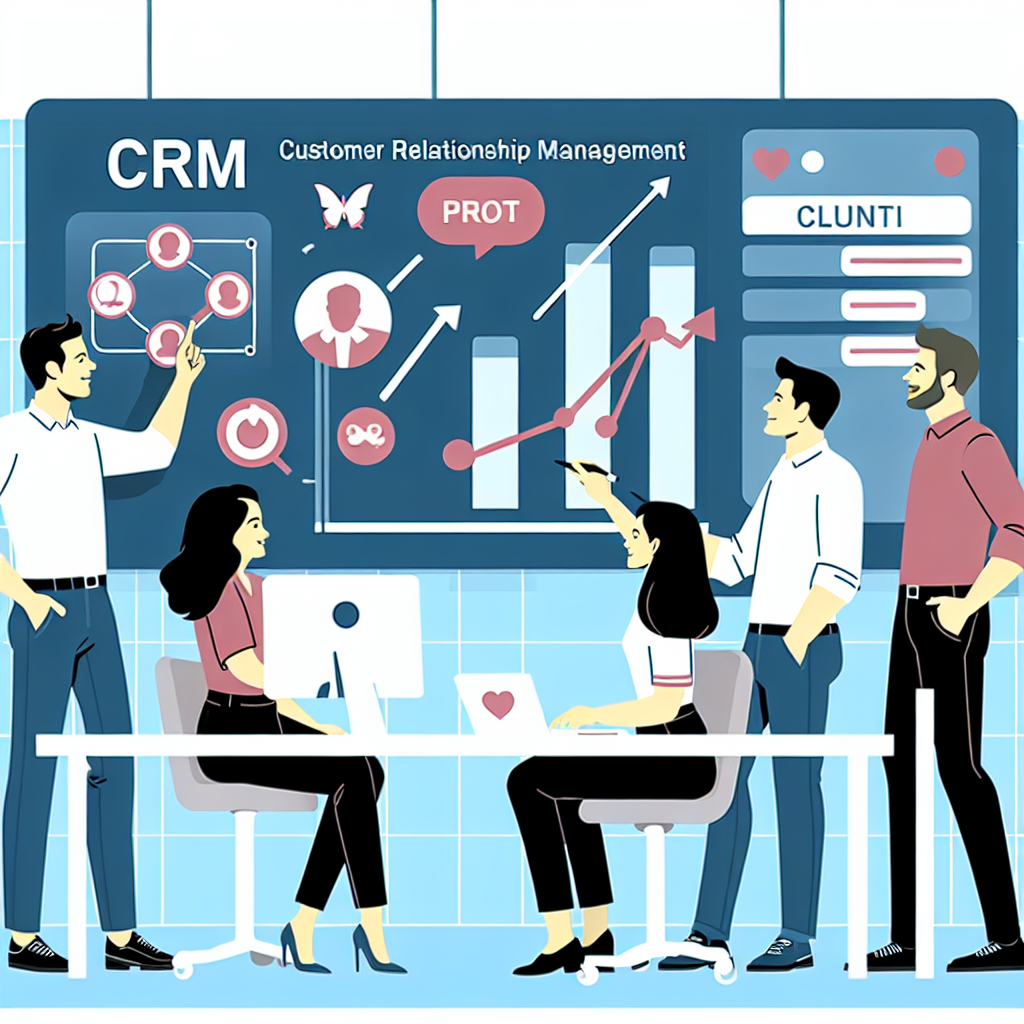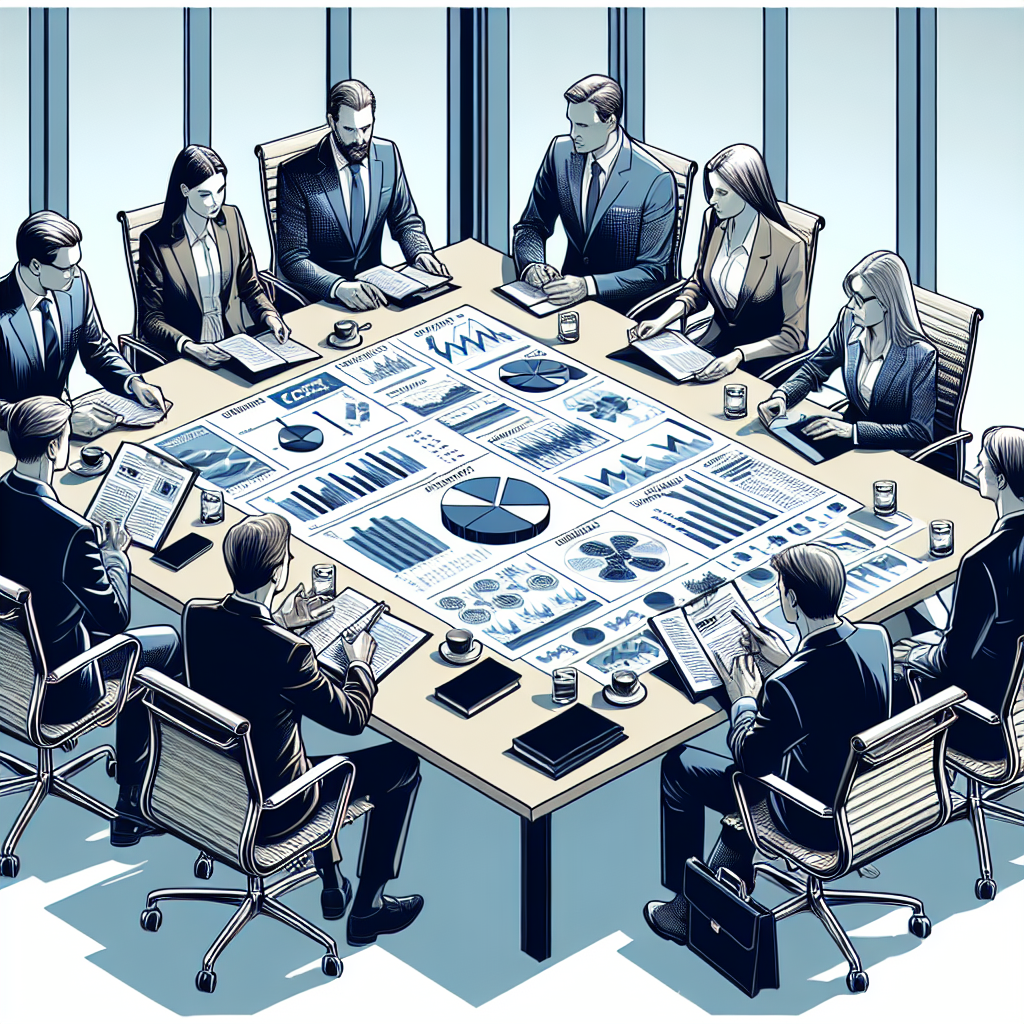Differences between CRM and ERP - Which Program to Choose for Your Business?
Choosing the right software for your business can feel overwhelming. Do you need a CRM (Customer Relationship Management) system or an ERP (Enterprise Resource Planning) system? Understanding the differences between CRM and ERP is essential for making a smart choice that aligns with your business goals. Lets break it down in a way thats easy to comprehend.
What Are CRM and ERP?
At its core, a CRM system helps businesses manage customer relationships. If you’re often juggling emails, social media interactions, and customer service requests, a CRM can streamline these processes, making customer interactions more efficient. For example, consider a retail business owner who uses a CRM to track customer purchases, address inquiries, and plan marketing campaigns. Everything is neatly organized in one platform, enhancing communication with clients.
On the other hand, an ERP system is broader in scope. It integrates various business functions like finance, HR, supply chain, and manufacturing into one cohesive system. For instance, imagine a manufacturing firm that uses ERP to coordinate production schedules, manage inventory, and handle payroll—all in real-time. This holistic view enables better decision-making and operational efficiency.
Key Differences
Let’s look at some key differences between CRM and ERP systems:
- Focus: CRM focuses on customer relationship management, while ERP is centered around resource planning and management.
- Scope: CRMs manage customer data; ERPs cover a wider range of internal processes.
- Users: CRMs are typically used by sales and marketing teams; ERPs are used across all departments.
- Implementation Cost: Implementing a CRM can cost around 6000 EUR, while an ERP might set you back approximately 12000 EUR.
| Feature | CRM | ERP |
| Primary Goal | Enhance customer relations | Streamline operations |
| Main Users | Sales and marketing teams | All departments |
| Data Handled | Customer data | All company resources |
| Support & Maintenance | Less complex | More extensive |
| Customization | Highly customizable | Usually requires significant customization |
Real Stories: Success with CRM and ERP
Consider the story of a local coffee shop, Cafe Aroma, which struggled with customer retention. The owner decided to implement a CRM system to better understand customer preferences. With access to detailed analytics, they launched targeted promotions that resulted in a 30% increase in repeat customers within three months! ☕⭐
Alternatively, a logistics company called Speedy Deliveries faced difficulties coordinating shipments and managing inventory. They turned to an ERP system for their operations. In just six months, they improved their delivery times by 25%, which significantly boosted customer satisfaction and profitability. ⭐⭐
Before deciding, here are a few expert tips you can consider:
- Assess Your Needs: Identify what problems you want to solve. Is it customer relations or internal operations?
- Choose Flexibility: Look for systems that can easily adapt to your changing business needs.
- Budget Wisely: Don’t just consider setup costs; also factor in long-term maintenance and support.
With 20 years of experience in the software development industry, our professional specialists at webmaster.md can help you choose the right software solution. Let’s discuss your unique business requirements! Call us at +373 601 066 66 or visit our website at webmaster.md. We provide all services in one place, ensuring you can focus on what you do best—running your business!
Frequently Asked Questions
- What is CRM for beginners?
A CRM system is designed to manage a companys interactions with current and potential customers. - What is an ERP system in simple terms?
An ERP system integrates all facets of a business, including planning, purchasing, and inventory. - What is the main role of CRM?
CRMs main role is to enhance customer satisfaction and improve relationships. - What areas does an ERP system cover?
ERP covers finance, HR, supply chain, manufacturing, and more. - What is the cost of implementing CRM and ERP?
CRM implementation can cost around 6000 EUR, while ERP implementation can cost approximately 12000 EUR. - How does CRM differ from ERP?
CRM focuses on customer relationships, while ERP focuses on resource management. - Which program should I choose for my business?
Choose CRM for better customer relationship management; opt for ERP for comprehensive resource planning. - Can I integrate both CRM and ERP?
Yes, many businesses benefit from using both systems together for optimal efficiency. - Do I need a specialized team to manage these systems?
While not always necessary, having trained staff can enhance the systems effectiveness. - What are some examples of CRM and ERP software?
Popular CRM software includes Salesforce and HubSpot; renowned ERP software includes SAP and Oracle.
How Does CRM Differ from ERP? Understanding Key Features and Benefits
When it comes to managing a business efficiently, understanding how CRM (Customer Relationship Management) systems differ from ERP (Enterprise Resource Planning) systems is crucial. Both are powerful tools, but they serve distinct purposes that can dramatically impact your company’s operations and success. Let’s dive into the differences in their features and benefits so you can choose the right system for your business.
Key Features of CRM
A CRM system is designed with the primary focus of managing relationships with customers. Here are some standout features:
- Contact Management: Easily store and organize customer information, including contact details, interaction history, and preferences.
- Sales Management: Track sales processes and manage your sales pipeline efficiently, helping your team close deals faster.
- Marketing Automation: Automate marketing campaigns based on customer segmentation and behaviors, resulting in personalized engagement.
- Customer Support: Streamline customer inquiries and issues with ticketing systems and knowledge bases.
- Analytics and Reporting: Generate insightful reports to analyze sales performance and customer insights, enabling informed decision-making.
For example, a boutique clothing store using a CRM can send personalized discounts to frequent customers, leading to a 20% increase in repeat sales within a few months! ⭐⭐
Key Features of ERP
On the other hand, an ERP system integrates various business processes and departments under one umbrella. Key features include:
- Inventory Management: Track inventory levels in real-time, send alerts for low stock, and manage restocking efficiently.
- Financial Management: Manage accounts payable/receivable, budgeting, and financial forecasting with ease.
- Human Resource Management: Streamline HR processes, including payroll, recruitment, and employee records.
- Supply Chain Management: Optimize logistics, demand planning, and supplier relationships to improve operational efficiency.
- Business Analytics: Analyze company performance across all departments with comprehensive reports and dashboards.
A manufacturing business utilizing an ERP system can effectively coordinate production schedules and reduce labor costs by 15% through enhanced resource allocation! ⭐⭐
CRM Benefits: Why Choose CRM?
Investing in a CRM system can yield numerous benefits, including:
- Enhanced Customer Satisfaction: Quick access to customer data allows for personalized service, strengthening relationships.
- Improved Sales Processes: By tracking leads rigorously, sales teams can focus on the most promising opportunities.
- Better Collaboration: Team members can share information seamlessly, ensuring everyone is on the same page.
For example, a local service provider saw a 25% increase in customer satisfaction ratings after adopting a CRM to manage client communications! ⭐⭐
ERP Benefits: Why Choose ERP?
Similarly, choosing an ERP system comes with distinct advantages, such as:
- Operational Efficiency: Integrated processes reduce redundancy, saving time and resources.
- Better Financial Management: Real-time visibility into financial metrics helps businesses make better budgetary decisions.
- Regulatory Compliance: Maintain compliance with industry regulations through comprehensive reporting and documentation.
A logistics company managed to cut overhead costs by approximately 20% after implementing ERP solutions to manage their shipping and inventory operations more effectively! ⭐⭐
Making the Right Choice for Your Business
So, which system is right for you? It largely depends on your business needs. If your focus is on enhancing customer interactions and improving sales strategies, a CRM system will likely serve you best. However, if you aim to streamline multiple internal processes and improve overall resource management, an ERP system should be your go-to solution.
Whatever your choice, our team at webmaster.md is here to help. With over 20 years of experience, we offer comprehensive services from software development to ongoing support. Reach out today at +373 601 066 66 or visit our website at webmaster.md to explore your options and set your business up for success!
Frequently Asked Questions
- What are the main differences between CRM and ERP?
CRM focuses on managing customer relationships while ERP manages resource planning across business functions. - Which system should I implement first?
If customer management is a priority, start with a CRM. For operational efficiency, consider an ERP first. - Can I integrate CRM and ERP?
Yes, many businesses benefit from the integration of both systems for seamless operations. - How long does it take to implement a CRM or ERP?
Implementation can vary but typically takes 3-6 months depending on the complexity of your needs. - What is the cost of implementing a CRM or ERP system?
A CRM usually costs around 6000 EUR to implement, while an ERP can range from 12000 EUR and up. - Do I need IT specialists to manage these systems?
While not essential, having skilled personnel can significantly enhance system effectiveness. - What are the most popular CRM and ERP systems?
Popular CRM choices include Salesforce and HubSpot. ERP options include SAP and Oracle. - How often should I update my CRM or ERP?
Regular updates are recommended to ensure security, functionality, and compliance with regulations. - Are CRM and ERP systems customizable?
Yes, both systems can be customized to fit the unique needs of your business. - What types of businesses benefit most from CRM and ERP?
Businesses of all sizes can benefit, but particularly those with complex customer interactions or resource management needs.

If you’re new to the world of business management software, understanding CRM (Customer Relationship Management) can feel like a daunting task. But fear not! This guide is tailored for beginners, breaking down what CRM is, why it matters, and how it can transform your business relationships and operations.
What Is CRM?
At its core, CRM is a technology designed to help businesses manage their interactions with current and potential customers. It’s a central hub where you can store and analyze customer data, track interactions, and streamline communication. Think of it as your businesss command center for all things customer-related. ⭐️⭐
Why Is CRM Important?
Understanding the importance of CRM revolves around building strong customer relationships. In todays competitive market, great customer experience is paramount. CRM can significantly enhance how you engage with your customers by allowing you to:
- Organize Customer Information: CRM consolidates all customer data—from contact details to past interactions—into one accessible platform.
- Improve Customer Service: By having instant access to customer history and preferences, your team can provide personalized service.
- Boost Sales: Track leads through the sales pipeline, ensuring no potential customer falls through the cracks.
- Enhance Marketing Efforts: Create targeted marketing campaigns based on customer data, leading to higher conversion rates.
For example, a local bakery that uses CRM can track customer orders and preferences. They might discover that Friday is the most popular day for pastries. By leveraging this data, they can run a Friday promotion, increasing sales and customer satisfaction! ⭐⭐
When considering CRM software, understanding its features is essential. Here are some fundamental components you’ll encounter:
- Contact Management: Keep tabs on customer details, history, and interaction logs in one place.
- Sales Tracking: Monitor sales progress and manage leads efficiently to increase conversion rates.
- Email Marketing: Automate campaigns to reach customers based on their preferences and behaviors.
- Reporting and Analytics: Generate reports to assess customer engagement and sales performance, allowing for strategic decision-making.
- Collaboration Tools: Facilitate teamwork between sales, marketing, and customer service teams for a unified approach.
How Does CRM Work?
At a high level, CRM software functions by collecting customer interactions from various channels such as email, phone calls, and social media. Here’s a simplified version of how it operates:
- Data Collection: Business interactions with customers are logged into the system.
- Data Analysis: CRM analyzes this data to identify trends, behaviors, and customer needs.
- Actionable Insights: These insights help businesses strategize and tailor their communications to enhance customer relationships.
Imagine using a CRM system to analyze data about your customers’ buying habits, allowing you to predict future purchases and market accordingly. This level of understanding can dramatically increase your sales opportunities! ⭐⭐
When selecting a CRM system, here’s what to consider:
- Usability: Look for a user-friendly interface that your team can quickly adapt to.
- Integration: Ensure it can integrate with existing tools (like email and financial software) to streamline processes.
- Customization: Opt for a solution that allows customizing features to fit your unique business needs.
- Support: Assess the level of customer support provided to help you troubleshoot issues.
For instance, if you’re running a small business, a simpler CRM option might be best to avoid overwhelming your team with complex features that they won’t use. ⭐⭐
Getting Started with CRM
Ready to embark on your CRM journey? Here are some steps to get going:
- Identify Your Goals: Determine what you wish to achieve with CRM—better sales tracking, improved customer service, or enhanced marketing efforts.
- Choose a CRM: Research and select a CRM that aligns with your objectives and budget.
- Train Your Team: Provide your staff with the necessary training to utilize the CRM effectively.
- Monitor and Adjust: Regularly assess how well the CRM is meeting your goals and make adjustments as needed.
At webmaster.md, we have 20 years of experience helping businesses like yours navigate the world of CRM and other software solutions. Whether youre just starting out or looking to optimize your current CRM setup, our professional specialists are here to assist you every step of the way. Contact us at +373 601 066 66 or visit our website at webmaster.md for personalized advice and solutions tailored to your business!
Frequently Asked Questions
- What does CRM stand for?
CRM stands for Customer Relationship Management and refers to software that helps businesses manage customer interactions. - How does CRM help my business?
CRM improves customer service, boosts sales, and organizes customer information efficiently. - Is CRM only for large businesses?
No! CRM systems cater to businesses of all sizes, providing essential tools for enhancing customer relationships. - Can CRM integrate with other software?
Yes, many CRM systems can be integrated with different business tools, enhancing productivity. - How much does a CRM system cost?
CRM costs can vary widely, generally starting around 6000 EUR, depending on features and complexity. - What are some popular CRM systems?
Popular options include Salesforce, HubSpot, and Zoho CRM. - Do I need technical skills to use CRM?
Most CRM systems are designed to be user-friendly, requiring minimal technical skills. - How often should I update my CRM?
Keep your CRM updated regularly to ensure all customer information is accurate and current. - Can CRM improve customer satisfaction?
Yes, CRM enables personalized service and faster response times, leading to higher customer satisfaction. - What resources are available for CRM training?
Many CRM providers offer online tutorials, webinars, and customer support to help users learn the system.
What Is the Cost of Implementing CRM and ERP? Budgeting for Business Success
When it comes to choosing software solutions for your business, knowing the costs associated with CRM (Customer Relationship Management) and ERP (Enterprise Resource Planning) systems is essential for successful budgeting. This chapter will break down the costs involved in implementing these systems, helping you make informed financial decisions for your business future.
Understanding CRM Implementation Costs
The cost of implementing a CRM system can vary significantly based on several factors, such as the size of your business, the complexity of your requirements, and the specific software you choose. Here’s a general breakdown of the potential costs:
- Software Licensing: Depending on the provider, CRM systems can range from 6000 EUR for basic packages to over 12000 EUR for advanced features.
- Customization: Tailoring a CRM system to fit your specific needs can cost anywhere from 1000 EUR to 5000 EUR, depending on the complexity.
- Training and Support: Training your team is crucial. Expect to invest around 500 EUR to 2000 EUR for comprehensive training resources and ongoing support.
- Maintenance and Upgrades: Ongoing maintenance can add an additional 15-20% of the initial cost annually, which is important to consider.
For instance, a small marketing agency that invests 8000 EUR in a CRM solution may find that additional customization and training push their total initial investment to around 10000 EUR. However, the potential increase in client engagement and sales could lead to significant returns! ⭐⭐
ERP systems generally have higher implementation costs due to their complexity and the breadth of features they offer. Lets look at the various components:
- Software Licensing: ERP solutions typically start at around 12000 EUR and can ascend to over 100000 EUR depending on the size and needs of your business.
- Customization: Customizing ERP software can range from 3000 EUR to well over 20000 EUR for larger enterprises with unique needs.
- Implementation Services: Hiring consultants or IT experts for setup usually costs between 5000 EUR to 20000 EUR, depending on the complexity.
- Training and Change Management: Allocating 1000 EUR to 5000 EUR for staff training and managing the change process is essential for successful adoption.
- Maintenance and Updates: Regular maintenance fees can be around 15-20% of the initial implementation cost, which should not be overlooked.
For example, a mid-sized manufacturing company might pay around 30000 EUR for an ERP system that includes necessary customizations and training. This upfront investment can lead to lower operational costs and improved profitability over time. ⭐⭐
Factors Influencing Cost
Several factors can influence the total cost of implementing CRM or ERP systems:
- Business Size: Larger companies may require more complex systems and greater customizations, increasing overall costs.
- System Complexity: More advanced features or integrations with existing systems can escalate costs quickly.
- Number of Users: Pricing models are often based on the number of users, leading to higher costs for larger teams.
- Industry-Specific Needs: Certain industries have unique requirements that can add to the cost of both software and implementation.
By considering these factors, businesses can better assess their potential ROI (return on investment) and determine which system—CRM or ERP—aligns best with their financial and operational goals. ⚖️⭐
Budgeting for Success
Creating a realistic budget is crucial when implementing software systems. Here are some steps to help you in your budgeting process:
- Assess Your Needs: Clearly outline what you want the CRM or ERP to accomplish for your business.
- Get Quotes: Reach out to vendors to get estimates, ensuring you compare features and pricing carefully.
- Include Hidden Costs: Remember to factor in training, support, and maintenance costs to avoid surprises down the line.
- Plan for the Long Term: Consider the potential growth of your business and how your software needs may change in the future.
Our team at webmaster.md can help you navigate these budgeting considerations and find the right software solution tailored to your needs. With 20 years of experience, we’re here to ensure your business achieves success through the right investment in technology. Feel free to contact us at +373 601 066 66 or visit our website at webmaster.md to discuss your options and get started on the path to efficiency and growth!
Frequently Asked Questions
- What is the average cost of implementing a CRM system?
The cost for CRM systems typically ranges from 6000 EUR to 12000 EUR depending on features and customizations. - How much does it cost to implement an ERP system?
ERP systems usually start around 12000 EUR and can exceed 100000 EUR for more extensive solutions. - What factors influence the cost of CRM and ERP?
Factors include business size, complexity of needs, number of users, and industry-specific requirements. - Are there any hidden costs in CRM ERP implementation?
Yes, factors like training, maintenance, and ongoing support can significantly impact your overall budget. - What is the ROI for CRM and ERP systems?
ROI can vary, but businesses often see improvements in efficiency and customer satisfaction, resulting in higher profits over time. - How long does it take to implement CRM or ERP?
Implementation time varies but typically ranges from a few months to over a year, depending on system complexity. - Do I need to hire IT specialists for implementation?
While not always necessary, having IT specialists help can streamline the process and ensure proper setup. - Can CRM and ERP systems be integrated?
Yes, many businesses choose to integrate both systems for a comprehensive approach to management. - What are the long-term cost considerations for CRM and ERP?
Maintenance, support, and potential upgrades should all be factored into long-term budgeting. - Should I evaluate several vendors before deciding?
Absolutely! Comparing quotes and features from different vendors can help you find the best value for your investment.






